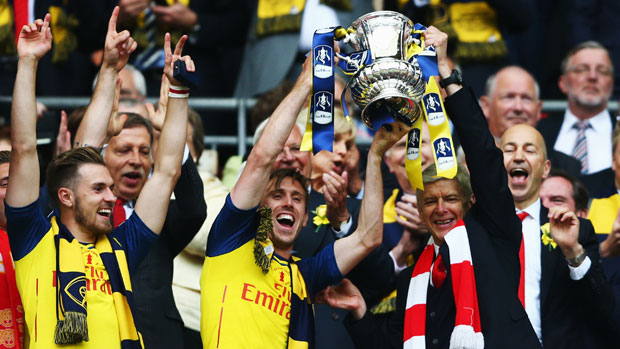Sad day for football romantics as Arsenal win the FA Cup
In a world dominated by money the tournament that 'anyone can win' has lost its magic

A free daily email with the biggest news stories of the day – and the best features from TheWeek.com
You are now subscribed
Your newsletter sign-up was successful
First things first: Arsenal were great at Wembley and congratulations to manager Arsene Wenger, and to Gunners supporters. But for romantics, the FA Cup, the tournament that we're repeatedly told "anyone can win", has become a disappointment.
Consider the facts:
- In the 13 seasons between 1966 and 1978, 13 different teams won the Cup.
- Since 1993, and the start of the Premier League, just eight different teams have won it.
- Arsenal, Chelsea and Man Utd have won 17 of the last 23 finals, and since 1997 Arsenal and Chelsea have won it 12 times between them.
- Between 1973 and 1980 three teams from the second tier of English football won the Cup (and one reached the final and was beaten)
- Since 1980 only three teams from outside the top flight have made the Cup Final and none of them has won.
The chances of a team from outside the Premier League winning the modern FA Cup is now remote to say the least.
The Week
Escape your echo chamber. Get the facts behind the news, plus analysis from multiple perspectives.

Sign up for The Week's Free Newsletters
From our morning news briefing to a weekly Good News Newsletter, get the best of The Week delivered directly to your inbox.
From our morning news briefing to a weekly Good News Newsletter, get the best of The Week delivered directly to your inbox.
The concentration of silverware among a few, very rich teams mirrors the way inequality has grown in our society too. When our society was more equal, football was more equal – and consequently more competitive too. A comparison between the 2014/15 football season and the 1974/5 season proves the point.
In 1975 the gap between rich and poor in the UK was as low as it had ever been. That year, the top ten teams in the old First Division were separated by just eight points. Even allowing for the fact that in those days there was just two points for a win it's a remarkable contrast to the Premier League table in 2014/5 – when the top ten were separated by a massive 39 points.
In 1974/5:
- Unfashionable teams such as Sheffield United, Middlesbrough, Stoke and Ipswich were involved in a wonderfully exciting and unpredictable title race. By December, six different teams had topped the table, including Carlisle United. Yes, Carlisle United.
- The lead changed hands an incredible 21 times and Derby County eventually won the title by two points. In 2014/15 Chelsea went top in August and were never displaced for the whole of the campaign.
The egalitarianism of the age was reflected in the cups too in 1974/5. First division Burnley lost at home to non-league Wimbledon in the FA Cup. Third division Walsall knocked out first division Newcastle and second division Man Utd (yes, United really were in the second division in 1974/5). First division Tottenham Hotspur and Sheffield United were knocked out by second division opposition.
A free daily email with the biggest news stories of the day – and the best features from TheWeek.com
Also that year, a second division team (Aston Villa) won the League Cup, beating another second division team (Norwich) in the final – and a second division team (Fulham) also got to the FA Cup final, where they were beaten by West Ham, who had finished only 13th in the top flight.
Yes, there were shocks in the FA Cup fourth round this year (League One Bradford won at Chelsea, and Championship Middlesbrough won at Man City), but once again, as predicted in The Week‘s intelligent punter's guide back in January, it was a Big Five team which prevailed in the end.
The formation of the Premier League and the Champions League, and other changes which benefited the biggest clubs, have created a situation where only a few, select clubs can reasonably expect to win major honours. There's a glass ceiling which makes it very, very difficult for other teams to win silverware.
That ceiling which didn't exist before, when well-managed provincial teams like Nottingham Forest could rise to the top flight and not only win the League title in their first season, but also go on to win two European Cups.
The monopoly situation is self-perpetuating – as it is in the wider economy. The richest buy the best assets (players) who then help them get even richer by winning trophies and qualifying for the extremely lucrative Champions League. Their increased wealth means that they can pay the very top wages to entice players away from other clubs, and so it goes on.
The situation will only change if there is radical restructuring of football, but of course, the richest clubs won't want that, and the other Premier League clubs are kept happy by ever-increasing money from television deals.
So, once again, congratulations to Arsenal, but for football romantics, who yearn for the time when the honours were more evenly spread around, there really wasn't much to cheer about in their all too predictable destruction of Aston Villa.
is a writer, broadcaster and blogger who writes The Week’s Intelligent Punter’s Guides. He is co-founder of the Campaign For Public Ownership. He tweets on sport @MightyMagyar and on politics and other subjects @NeilClark66